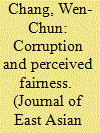| Srl | Item |
| 1 |
ID:
181843


|
|
|
|
|
| Summary/Abstract |
Corruption can erode political trust and a well-functioning democratic system, but it is unclear whether perceptions of corruption are significantly associated with citizens’ perceptions about the fairness of income distribution. This study thus examines the role of political trust in shaping the relationship between perceptions of corruption and perceived fairness of income distribution for East Asian countries. The findings show that perceived corruption has strong detrimental effects on political trust, and that those who have lower levels of political trust are more likely to perceive the income distribution as unfair in their countries. Causal mediation analysis results indicate that political trust plays an important role in mediating the negative effect of perceived corruption on perceived fairness of income distribution. Moreover, the results from examining the mutual causality linking corruption, political trust, and perceived fairness suggest that the reciprocal causal effects are also significant and robust.
|
|
|
|
|
|
|
|
|
|
|
|
|
|
|
|
| 2 |
ID:
112910


|
|
|
|
|
| Publication |
2012.
|
| Summary/Abstract |
To raise public acceptance of new energy policies, promoting the fairness of the outcomes and of the decision-making procedure has been suggested. Very few studies have examined the role of fairness in public acceptance of rebuilding nuclear power plants. Therefore, using a large mail survey, we investigated the public's acceptance of the decision to rebuild nuclear power plants in Switzerland by 2020. The study examined the influence of procedural fairness and outcome fairness on the acceptance of this decision, as well as other factors such as risk perception and benefit perception. Additionally, we investigated the moderating influence of general attitudes towards nuclear power on the relation between fairness and decision acceptance. Results indicated that outcome fairness strongly increased decision acceptance, along with general attitudes towards nuclear power and perceived economic benefits. Procedural fairness had only a small impact on decision acceptance. The influence of fairness on decision acceptance did not seem to depend on general nuclear attitudes. Our findings imply that, in the case of rebuilding nuclear power plants, perceived benefits and outcome fairness are important determinants of acceptance of the decision, while procedural fairness only has a limited impact.
|
|
|
|
|
|
|
|
|
|
|
|
|
|
|
|